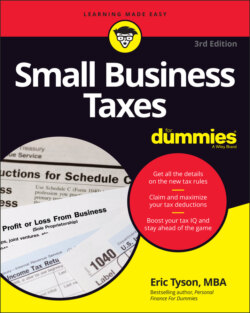Читать книгу Small Business Taxes For Dummies - Eric Tyson - Страница 54
Understanding corporate taxes
ОглавлениеCorporations are taxed as entities separate from their individual owners. This situation can be both good and bad. Suppose that your business is doing well and making lots of money. If your business isn’t incorporated, all your company’s profits are taxed on your personal tax return in the year that you earn those profits.
If you intend to use the profits to reinvest in your business and expand, incorporating can appear to potentially save you some tax dollars. When your business is incorporated (as a regular or so-called C corporation), effective 2018, all of your profits are taxed at the 21 percent corporate tax rate, which is lower than most of the individual income tax brackets for moderate and higher income earners.
But, there’s more to this tax rate comparison story. Unincorporated small businesses that operate as so-called pass-through entities (for example, sole proprietorships, LLCs, partnerships, and S corporations), named so because the profits of the business pass through to the owners and their personal income tax returns, have a new advantage. To address the fact that business owners that operated their business as a pass-through entity could face a higher personal federal income tax rate than the 21 percent rate levied on C-corporations, Congress provided a 20 percent deduction for those pass-through businesses. So, for example, if your sole proprietorship, LLC, partnership, or S-corporation netted you $80,000 in 2022 as a single taxpayer, that would push you into the 22 percent federal income tax bracket, a bit above the corporate rate of 21 percent. But, you get to deduct 20 percent of that $80,000 of income ($16,000), so you would only owe federal income tax on the remaining $64,000 ($80,000 – $16,000). Another way to look at this is that the business pass-through owner would only pay federal income taxes on 80 percent of his profits and would be in the 22 percent federal income tax bracket. This deduction effectively reduces the 22 percent federal income tax bracket to 17.6 percent, which is lower than the 21 percent corporate tax rate.
One caveat to the previous points: The 20 percent pass-through deduction gets phased out for service business owners (such as lawyers, doctors, real estate agents, consultants, and so on) at single taxpayer incomes above $170,050 (up to $220,050) and for married couples filing jointly incomes over $340,100 (up to $440,100). For other types of businesses above these income thresholds, this deduction may be limited so consult with your tax advisor.
Resist the temptation to incorporate just so you can leave your money in the corporation, which may be taxed at a lower rate than you’d pay on your personal income. Don’t be motivated by this seemingly short-term gain. If you want to pay yourself the profits in the future, you can end up paying more taxes. Why? Because you pay taxes first at the corporate tax rate in the year your company earns the money, and then you pay taxes again on these same profits (this time on your personal income tax return) when you pay yourself from the corporate till in the form of a dividend.
Another possible tax advantage for a corporation is that corporations can pay, on a tax-deductible basis, for employee benefits such as health insurance, long-term-care insurance, disability insurance, and up to $50,000 of term life insurance. The owner usually is treated as an employee for benefits purposes. (See the later section “Benefits that are deductible for corporation owners” for details.) Sole proprietorships and other unincorporated businesses usually can take only tax deductions for these benefit expenses for employees. Benefit expenses for owners who work in the business aren’t deductible, except for pension contributions and health insurance, which you can deduct on the front of IRS Form 1040.
Another reason not to incorporate, especially in the early years of a business, is that you can’t claim the losses for an incorporated business on your personal tax return. On your business tax return, you have to wait to claim the losses against profits. Because most companies produce little revenue in their early years and have all sorts of start-up expenditures, losses are common.
